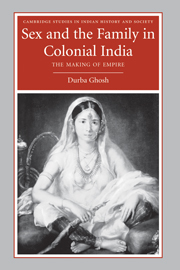Book contents
- Frontmatter
- Contents
- Paintings credits
- Acknowledgments
- Introduction
- 1 Colonial companions
- 2 Residing with begums: William Palmer, James Achilles Kirkpatrick and their “wives”
- 3 Good patriarchs, uncommon families
- 4 Native women, native lives
- 5 Household order and colonial justice
- 6 Servicing military families: family labor, pensions, and orphans
- Conclusion
- Bibliography
- Index
- Miscelloneous Endmatter
1 - Colonial companions
Published online by Cambridge University Press: 05 August 2014
- Frontmatter
- Contents
- Paintings credits
- Acknowledgments
- Introduction
- 1 Colonial companions
- 2 Residing with begums: William Palmer, James Achilles Kirkpatrick and their “wives”
- 3 Good patriarchs, uncommon families
- 4 Native women, native lives
- 5 Household order and colonial justice
- 6 Servicing military families: family labor, pensions, and orphans
- Conclusion
- Bibliography
- Index
- Miscelloneous Endmatter
Summary
An early nineteenth-century British guidebook for India, or “complete guide to gentlemen intended for the civil, military, or naval service of the Honourable East India Company,” listed ways that Englishmen could productively avail themselves of native women who would labor as housekeepers and could also become “bosom friends.” Capt. Thomas Williamson, who had spent much of the 1780s and 1790s in India noted that concubinage was a widespread practice because it was much more practical and economical to cohabit with a native companion than it would have been to marry a European woman. Other British descriptions similarly acknowledged that European men commonly cohabited with local women: “It is a very general practise for Englishmen in India to entertain a cara amica of the Country,” wrote one commentator in 1805.
In spite of the prevalence of interracial conjugal arrangements, many British observers agreed that these domestic arrangements were rarely publicly acknowledged. One wrote that these relationships were, “at the same time so tacitly sanctioned by married families, who scruple not to visit at the house of a bachelor that [sic] retains a native mistress.” Even Williamson observed that, “no lady, native of India, even though her father should have been of the highest rank in the King's or Company's service, and though she be married to a person of that description, is ever invited to those assemblies given by the governor on public occasions.”
- Type
- Chapter
- Information
- Sex and the Family in Colonial IndiaThe Making of Empire, pp. 35 - 68Publisher: Cambridge University PressPrint publication year: 2006

